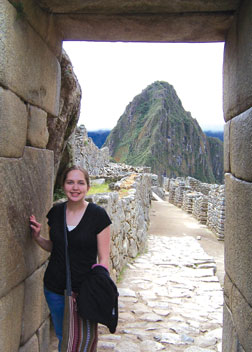Experiencing Language-Based Discrimination Firsthand
 Sarah Henrich at Machu Picchu.
Sarah Henrich at Machu Picchu.During her summer abroad, Sarah Henrich lived with a Peruvian family in Cusco, the historic capital of the Inca Empire. She took courses in Latin American literature and modern Peruvian culture, and she saw firsthand how discrimination based on language can dissuade young children from learning to speak it.
The recipient of a $3,000 William and Bernice McKeever Award through Pitt’s Nationality Rooms Scholarship Program, Henrich spent six weeks in Peru in the summer of 2009. Each year, Pitt’s Nationality Rooms committees offer scholarships, and in approximately the last 60 years more than 1,000 students have received a total of $2 million to help finance their international academic adventures.
“I went mainly to take classes,” says Henrich, 22, who graduated from Pitt earlier this year with bachelor’s degrees in linguistics and anthropology and certificates in West European Studies and Latin American Studies. “But one of my main motivations for going to Cusco was that I would be studying Quechua. Obviously, there are not many opportunities to do that outside of northwestern South America.”
Quechua is an indigenous language of the South American Andes. It was the language of the Incas and is spoken today by about 10 million people, mostly in Peru, Bolivia, and Ecuador.
In Peru, people who speak only Quechua are found mostly in the rural highlands, and many are economically disadvantaged. Many also have distinctively indigenous physical features. In cities such as Cusco, Henrich saw how Quechua-speaking people were almost always judged to be poor and backward by the largely Spanish-speaking population.
“It became very clear to me how people will discriminate against one another on the basis of language, Henrich said. “We talked about that in my Quechua classes at Pitt. But when you talk to friends who are Spanish monolinguals who don’t want to speak to Quechua speakers because they see them as lesser people, it becomes clear that language discrimination is a huge issue. That was what hit me the most when I was in Peru.
“What was interesting was I was able to observe this fact while living with a middle-class Peruvian family," Henrich added. “They had indigenous features, but they certainly didn’t speak Quechua. They thought it was interesting that I wanted to study Quechua, and they enthusiastically supported my interest in the language. But when I interviewed a member of the family, he said he didn’t have any friends who spoke Quechua, and his little boy didn’t want to learn Quechua. And that says a lot when children don’t want to learn a language because they think it’s bad. For Peruvians, the rejection of Quechua is intricately tied to racism, economics, and many other social factors.”
Other Stories From This Issue
On the Freedom Road

Follow a group of Pitt students on the Returning to the Roots of Civil Rights bus tour, a nine-day, 2,300-mile journey crisscrossing five states.
Day 1: The Awakening
Day 2: Deep Impressions
Day 3: Music, Montgomery, and More
Day 4: Looking Back, Looking Forward
Day 5: Learning to Remember
Day 6: The Mountaintop
Day 7: Slavery and Beyond
Day 8: Lessons to Bring Home
Day 9: Final Lessons

